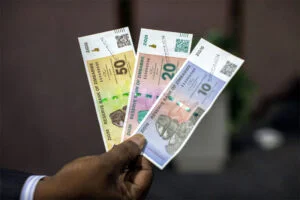
Why The ZiG Currency in news?
- Zimbabwe’s economic woes are well documented. Hyperinflation in 2009, estimated at a staggering 5 billion percent, rendered the Zimbabwean dollar virtually worthless.
- A now-infamous 100-trillion Zimbabwe dollar bill stands as a stark reminder of this tumultuous period.
- In response, the country adopted a multi-currency system, with the US dollar becoming the de facto national currency.
- However, the yearning for a local, stable currency persisted. Enter the Zimbabwe Gold (ZiG), launched in April 2024 as the sixth attempt in 15 years to establish a national currency.
- Backed by gold reserves, the government hoped the ZiG would inspire trust and wean the country off its reliance on the US dollar.
Building Trust: A Herculean Task
- The launch of the ZiG was met with a government-led publicity blitz. Music videos and public appearances by ZANU-PF, the ruling party, extolled the virtues of the new currency.
- Yet, public skepticism remained deeply entrenched.
- Memories of past hyperinflation and the ongoing economic struggles cast a long shadow.
- The US dollar continued to dominate large transactions like rent and school fees, a testament to its perceived stability.
Enforced Usage: A Controversial Approach
- Facing a lukewarm public response, the government resorted to more forceful measures. Crackdowns on black-market currency exchange targeted dealers offering rates above the official exchange.
- These arrests sparked criticism from the international economic community, who viewed them as heavy-handed tactics. Economists argue that fostering trust in a currency requires a holistic approach, not just punitive measures against black-market activity.
Challenges Persist: A Long Road Ahead
- The path towards a thriving ZiG currency remains arduous. Here are some of the key hurdles:
- Economic Stability: The success of the ZiG hinges on a robust Zimbabwean economy. Without addressing the root causes of inflation and economic instability, the ZiG risks suffering the same fate as its predecessors.
- Public Confidence: Building public trust takes time and a proven track record of stability. Aggressive enforcement measures alone cannot erase past experiences of hyperinflation.
- Multi-Currency System: The continued presence of the US dollar as a dominant currency creates an uneven playing field. Until the ZiG proves its stability and purchasing power, widespread adoption will be difficult.
A Glimmer of Hope? The Potential Benefits
- Despite the challenges, the ZiG holds some potential benefits:
- Reduced Reliance on Foreign Currency: A successful ZiG could lessen Zimbabwe’s dependence on foreign currencies and bolster its economic sovereignty.
- Increased Transparency: A well-managed national currency can improve transparency in financial transactions and economic analysis.
- National Pride: A thriving ZiG currency could serve as a symbol of national pride and economic independence.
The Future of the ZiG
- The success of the ZiG hinges on a multi-pronged approach. The government must prioritize economic reforms that address inflation and promote sustainable growth.
- Simultaneously, rebuilding public trust through consistent policies and transparency is crucial. Finally, fostering a healthy exchange rate environment that discourages black-market activity will be vital.
- The road ahead for the ZiG remains uncertain. It faces an uphill battle against public skepticism and a deeply entrenched multi-currency system. However, if the government prioritizes economic stability and rebuilds public trust, the ZiG may yet become a symbol of a resurgent Zimbabwean economy.
People also ask
Q1: What is the ZiG?
Ans: The ZiG, or Zimbabwe Gold, is the latest attempt by the Zimbabwean government to establish a national currency. Launched in April 2024, it’s the sixth attempt in 15 years and is backed by gold reserves.
Q2: Why did Zimbabwe introduce a new currency?
Ans: Zimbabwe’s previous currency collapsed due to hyperinflation in 2009. Since then, they’ve relied on a multi-currency system dominated by the US dollar. The government hopes the ZiG will foster trust and reduce reliance on foreign currencies.
Q3: How has the public reacted to the ZiG?
Ans: Public skepticism is high. Memories of hyperinflation and ongoing economic struggles make people hesitant to adopt the new currency. The US dollar remains preferred for large transactions.
Thanks for sharing. I read many of your blog posts, cool, your blog is very good.
Can you be more specific about the content of your article? After reading it, I still have some doubts. Hope you can help me.